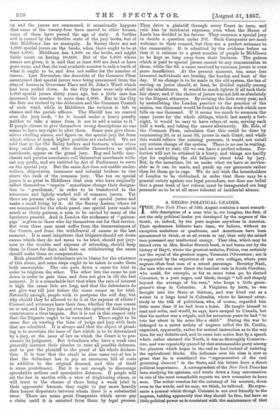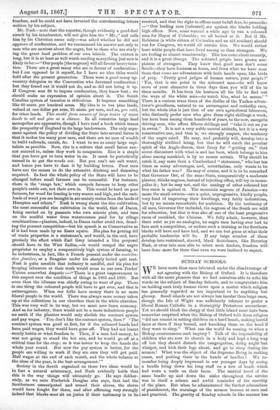A NEGRO POLITICAL LEADER.
THE New York Times of 16th August contains a most remark- ' able description of a man who is, we imagine, the first, if not the only political leader yet developed by the negroes of the South, or, indeed, by the pure negroes anywhere in America. Their spokesmen hitherto have been, we believe, without an exception mulattoes or quadroons, and Americans have been accustomed to think, or at all events to say, that only the mixed race possessed any intellectual energy. That idea, which may be traced even in Mrs. Becher Stowe's book, is not borne out by the history of Hayti, where the greatest mulatto, Potion, was certainly not the equal of the greatest negro, Toussaint POuverture ; nor is it supported by the experience of our own colleges, where pure negroes often beat men of a mixed parentage. Beverley Nash, the man who can now throw the heaviest vote in South Carolina, who could, for example, as far as mere votes go, be elected Governor, is a pure negro, coal black, though " tall and shapely beyond the average of his race," who keeps a little green- grocer's shop in Columbia. A Virginian by birth, he was brought into the State at thirteen, and was hired out as a waiter in a large hotel in Columbia, where he listened atten- tively to the talk of politicians, who, of course, regarded him little more than if he had been a horse. He taught himself to read and write, and would, he says, have escaped to Canada, but that his mother was a cripple, and for seventeen years heiad "to tote her about in his arms like a child." During the war he belonged to a secret society of negroes called the St. Cecilia, organized, apparently, rather for mutual instruction as to the war than for any definite end, and he came into notice first by a speech which rather alarmed the North, it was so thoroughly Conserva- tive, and was repeatedly quoted by that statesmanlike party among the planters which hopes in the end to lead instead of resisting the agricultural blacks. His influence over his class is now so great that he is considered the " representative of the real governing element" in the State, and his letters have a direct political importance. A correspondent of the New York Times has been studying his opinions, and wrote down a long conversation in one of the most remarkable reports we ever remember to have seen. The writer vouches for the accuracy of his account, down even to the words, and he may, we think, be believed. He repre- sents a journal which though Unionist is not over friendly to the negroes, holding apparently that they should be free, but have as little political power as is consistent with the maintenance of that
freedom, and he could not have invented the corroborating letters written by his subject.
Mr. Nash—note that the reporter, though evidently a good deal struck by his interlocutor, will not give him the " Mr.," and calls him by his Christian name only—was asked whether he did not approve of confiscation, and we recommend his answer not only to men who are anxious about the negro, but to those who are study- ing the great land problem of our own islands. The extract is long, but it is at least as well worth reading as anything just now is likely to be:—" Our people [the negroes] will all favour he,avy taxa- tion. There are a great many who are in favour of confiscation ; but I am opposed to it myself, for I have no idea titles would hold after the present generation. There were a good many up- country delegates to the Convention who favoured confiscation ; but they found out it would not do, and so did not bring it up. If Congress sees fit to impose confiscation, they know best ; we should make no expression of opinion about it. The South Carolina system of taxation is ridiculous. It imposes something like 60 cents. per hundred acres. My idea is to tax pine lands, valued at one dollar per acre, 25 cents. per acre, and so, pro raid, for other lands. This would force owners of large tracts of waste -lands to sell and give us a chance. In all countries large land monopolies are oppressive, though I have read a book which traces the prosperity of England to its large landowners. The only argu- ment against the policy of dividing the State into several farms is that it makes too many poor men, and there are no men of wealth to build railroads, canals, &c. I want to see as many large capi- talists as possible. Now, rice is a culture that small farms can- not succeed in, unless they work in companies. Rice is a staple that you have got to turn water in on. It must be periodically turned in to get the weeds out. But you can't use salt water, and hence you have to dam it by building levees. Poor men have not the means to do the extensive ditching and damming .required. In fact the whole policy of the State will have to be -changed before small farmers can be successful. For instance, there is the 'range law,' which compels farmers to keep other people's cattle out, not their own in. This would be hard on poor farmers, for wood for fencing is very scarce and high, and the cart- loads of wood you see brought in are mainly stolen from the lands of Hampton and others." Nash is wrong about the rice cultivation, the most successful rice cultivation in the world, that of Dacca, being carried on by peasants who own minute plots, and turn on the needful water from watercourses paid for by village -combinations—planters, indeed, in Dacca rather avoid rice, dread- ing the peasant competition—but his speech is as Conservative as if it had been made by an Essex squire. His plan for getting rid -of waste properties is a statesman's, and would, in the end, have precisely the effect which Earl Grey intended a like proposal -shotild have 'in the West Indies,—it would compel the negro proprietor to employ a comparatively high system of farming, to be industrious, in fact, like a French peasant under the contribu- aion fonciere, or a Bengalee under his sharply levied quit rent. Nash is quite sensible that industry is needful, and his plan for keeping labourers at their work would seem to our own Trades' Unions somewhat despotic :—" There is a great improvement in this respect over the condition of things in 1865 and 1866. But -even then the idleness was chiefly owing to want of pay. There is one thing the coloured people will have to get over, and that is -extravagance. When our folks have money there is no more liberal people in the world. There was always more money taken alp at the collections in our churches than in the white churches. This was very well in its way, but we must now learn economy. And as for industry, there would not be a more industrious people on.earth if the planters would only abolish the contract system and pay wages. ' You don't like the contract system, then ?" The contract system was good at first, for if the coloured hands had
been paid wages, they would have gone off. They had not learnt steady habits or what freedom is. Then, if a man had money, he
was not going to stand the hot sun, and he would go off at a critical time for the crop; so it was better to keep the hands the whole year round. But now the pay system is better, for the people are willing to work if they are sure they will get paid. Half wages at the end of each month, and the whole balance at the close of the year, is the bast arrangement."
Society in the South organized on these two ideas would be in fact a natural aristocracy, and Nash evidently holds that this is the way things will ultimately go. He says deliber- ately, as we note Frederick Douglas also says, that had the Southerners emancipated and armed their slaves, the slaves
would have fought for them, and after affirming very strongly indeed that blacks must sit on juries if their testimony is to be received, and that the right to offices must be left free, he proceeds: —" Our leading men [coloured] are against the blacks holding high offices. Now, some wanted a while ago to run a coloured man for Mayor of Columbia ; we all hooted at it. But if Mr. Robinson (a white citizen of Columbia and an old resident) should run for Congress, we would all sustain him. We would rather have white people that have lived among us than strangers. We are feeling so almost unanimously. This has come about recently, and it is a great change. The coloured people have grown aus- picious of strangers. They know that good men don't come South—they have business at home, and from what we have seen those that come are adventurers with both hands open, like birds of prey. Pretty good judges of human nature, your people ?' ' Yes, that is one point in the coloured man—he will know more of your character in three days than you will of his in three months. It has been his business all his life to find out the ways of the white man—to watch him, what he means.' " There is a curious trace there of the dislike of the Yankee adven- turer's greediness, natural to an extravagant and unthrifty race, but the whole idea is just that of our own agricultural labourers, who distinctly prefer men who give them eight shillings a week, but have been among them hundreds of years, to the new, energetic driving man, who offers fifteen shillings and " take it out on yer in sweat." It is not a very noble mental attitude, bnt it is a very conservative one, and that is, we strongly suspect, the tendency of the negro mind. He may, and probably will, develop into a thoroughly civilized being, but that he will catch the peculiar spirit of the Anglo-Saxon, that fancy for " getting on," that secret discontent with what is and has been, which belongs to him alone among mankind, is by no means certain. Why should ha catch it, any more than a Cumberland " statesman," who has ten times as many advantages, and, nevertheless, only wants to be what his father was? He may of course, and it is to be remarked that Governor Orr, of the same State, comparatively a moderate planter, thinks negroes, instead of rejecting office, will try to mono- polize it ; but he may not, and the analogy of other coloured but free races is against it. The mountain negroes of Jamaica—we mean the small owners—are a quiet, unprogressive, kindly people, very fond of improving their dwellings, very fairly industrious, but by no means remarkable for ambition. By the testimony of all men, Governor Orr included, the negroes of the South are wild for education, but that is true also of one of the least progressive races of mankind, the Chinese. We fully admit, however, that there exist as yet no analogies, no negro race having ever had to face such a competition, or endure such a training as the Southern blacks will have and have had, and we can but guess at what their probable tendencies will be. If any large number of them develop into restrained, shrewd, black Scotchmen, like Beverley Nash, or even into men able to select such leaders, freedom will have done more for them than even we were inclined to expect.































 Previous page
Previous page